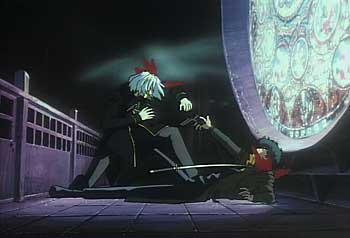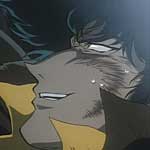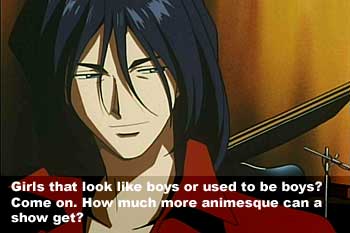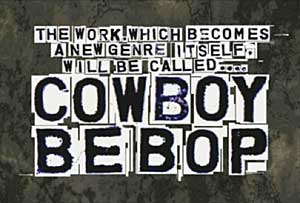 |
|
"Cowboy Bebop" Showdown |
||
|
|
|
Point - Matt Long drag on the cigarette, one quick stare, and the enemy drops like a sack of second drafts. Forget "Cowboy Bebop." I'm talking about this column. E.W.C. is just a bad memory, having scurried back under the rock of acronyms from whence she came. Next up: Stephanie Sheh. A hotshot vice-president type from the corporate office (you know the corporate office - it's the room down the hall). So confident is Miss Sheh as she approaches our showdown that she handpicked this week's column. "Cowboy Bebop" - imagine that. As Humphrey Bogart would tell me: you'll never get a fair fight in a film noir.
But that's not what worries me. She can have her so-called expertise. Being stupid never hurt anyone, and I'm not that into winning. I care about you - the reader. And the sad fact is: I like "Cowboy Bebop." It's a great show. Two people disagreeing about a subject is interesting. We call it debate. Two people ripping something to shreds is also interesting. We call it bitching. But two people talking about how good something is�that's like Ebert and Ebert, and I think we all know how important a Siskel is. So what am I to do? How will I squeeze blood out of this cheese-soft prompt? I wonder... Rechecking my notes I see nothing but positives. "Cowboy" delivers well-crafted genre storylines, a diverse visual vocabulary, and the rare ability to blend music, pictures, and dialogue into a little something we call style. But there's more to the show than groovy composition and a swinging sound track - a conceptual understanding that sets the show apart. I believe there is a visceral quality to photography and human actors, a sort of gut-check reaction not present in animation. A good actor crying on film is more affecting than a well-drawn character fighting back the ever-present glimmer under the right eye. Feel free to disagree (if you must) but the bigger point here, the one I think we can all agree on, is that anime's strength is not depicting tender moments of emotional loss. You've got a blank cell. You can draw anything you want. And you're going to draw a picture of a high school girl crying in her dorm room? That's a waste. Free from the constraints of a thirty-pound camera, the animator can take you inside the action - and the key word there is action. "Cowboy Bebop" understands this. It wisely operates under the all-encompassing shadow of film noir, and the canons of noir dictate a style that is highly visual and slightly ironic - a perfect fit for anime.
...yes, yes. It's all coming together for me now. Not just what makes "Cowboy Bebop" such a good show, but also how to stir a little bile into this love potion of a column. How's this: "Cowboy" is such a good show because it is basically an American show. Look at the title. Cowboy and Bebop. The Old West and Jazz, two fundamentally American inventions. Follow me here. What crystallizes "Cowboy," brings together its various element and turns them into a stylistic success, is an understanding of genre. Most anime only references other anime. It's like a flexible pervert going down on himself. But Bebop embraces the influences of film noir. Did they embrace a traditional Japanese genre, whatever the hell that would be? No. They went straight for an American export (by way of German Expressionism�). And the trade imbalance doesn't end there. "Bebop" makes multiple references to the genre of the American Western; the whole notion of the bounty hunter, the way Spike talks to his ship like a horse ("you thirsty, girl?"), not to mention the TV show. And are those funky baselines I hear in the background? Might there be a few references to Blaxploitation as well? I see afros and scantily clad women with their arms tied above their heads. That sounds pretty ghetto, and pretty American, to me. Combine all of these genres, throw in a little sarcasm and a few good pop songs in the soundtrack, and I remember a certain Mr. Tarentino and something the critics called neo-noir. "Cowboy Bebop" as "Pulp Fiction" in space. Now we're cooking.
Not only are the genres American, so are the characters. Spike is young and cocky. And a hotshot pilot. Somebody call Tom Cruise. The ex-cop with the gruff exterior, the hustler with a heart of gold and a twenty-four inch waist. Show me a Hollywood movie made in the last eighty years that didn't feature at least one of those character archetypes and I'll show you a movie inspired by the French. "Cowboy Bebop" succeeds because it puts down those little chocolate covered sticks and picks up a barrel of all American buttered popcorn. And in doing so it keeps excellent company. Kurosawa, the great Japanese director, made movies so deeply ingrained in American culture that when they were remade in Italian they still came out as Westerns. And "Beat" Takeshi, the pre-eminent actor/director, is like Robert DeNiro and Martin Scorsese rolled into one. He can single handedly make "Goodfellas" - and he does. About once every two years. In Japanese. Yessir, the path to artistic aplomb leads West, my friends (or East, if you live in France). And for those anime purists left behind by "Bebop" and the inevitable fusion of Western artistic sensibilities...well, now you know how my Grandad felt when they redesigned the Cadillac to make it look more like a Honda. (Matt) |
|||||||
|
Counterpoint - Stephanie A tough guy exterior, one cocky swagger, and the inexperienced upstart believes he owns the field. I'm not talking about space cowboy Spike Spiegel here, but the kare of this column, Matt Yamashita. Don't get me wrong, Matt's a smart boy and a good writer too. (I wouldn't have hired him if he wasn't). But sometimes this hotheaded anime newbie just doesn't have all the background to support his polemic tirades. For although Matt may be a quick draw, his small (yes, VERY small) gun isn't always fully loaded. You can't really blame him though. Matt's background doesn't lie in fandom, but porn sites and highly offensive and bizarre sketch comedy. However, since the KareKano column's inception, Matt has on occasion come up with some rather sophisticated and insightful commentary on anime in today's society. And then there are times when Mr. Yamashita lives up to his moniker of a mountain of sh*@.
But let's give credit where credit is deserved. A nice shiny apple to Matt for recognizing "Cowboy Bebop" as a quality show and picking up on its stylistic infusion of eclectic genres. Good boy. Although it doesn't take a genius to figure that one out, especially when a show calls itself, "the work which will become a new genre itself." Readers have no fear. Even though for the most part, I agree with Matt, there are some points of contention. Sure "Bebop" delivers well-crafted dialogue, music and genre storylines. I could go on forever about Shinichiro Watanabe's excellent direction, Yoko Kanno's superb compositions and the voice actors' (both Japanese and English) fine performances. But heaven forbid I play Ebert to Matt's Ebert. So let's just focus on the disagreements and personal attacks. "Cowboy Bebop" is a work of excellence not because it is an American show or that it samples from American genres, but because it mixes in all the appropriate elements of different genres to create a style all its own. Matt's limited anime knowledge leads him to believe that this is something new to anime when in reality borrowing from different cultures and styles is something not only anime but Japan has been doing for decades. Look at Japanese fashion, pop culture or even the existence of manga. In turn, a large part of "Cowboy Bebop's" style is anime and Japanese. While its different episodes pay tribute to different movements and periods, the show never feels stylistically fragmented, but retains an overarching flavor. "Bebop" succeeds not because it chooses to take specifically American elements, but because it knows how to select the correct elements of any genre and meld it into a new form. Besides, if Matt's argument is true, then the corollary is that all things American are great. And as much as we'd all like to believe that, we know it can't be true.
So while I admit that "Bebop" succeeds at embracing American pop culture, I still affirm that the show is very Japanese. Matt says that the characters are American character archetypes, describing Spike as a young and cocky hotshot pilot. Well geez, surely I can't disagree with that. I mean, I've never watched an anime series featuring young and cocky hotshot pilots, especially not classic and popular anime shows named "Gundam" or "Macross." And let's not forget the "Bebop" characters that redefine gender lines. Take Ed for example. Ed looks like a boy, acts like a boy and even has a boy's name. Edward doesn't even think of or refer to herself as either gender. Edward is Edward. And then there's Gren in the "Jupiter Jazz" two-parter Faye tries to seduce him. But he has breasts! Girls that look like boys or used to be boys? Come on. How much more animesque can a show get? Wait, there's more. In this intergalactic future, Spike, Jet, Faye, Ed and Ein bebop back and forth between various planets, each with its defining characteristics, Earth included. And surprise surprise, out of all the heavenly bodies, the creators made Earth the barren wasteland. This can't be because postwar Japan has a fondness for portraying a futuristic Earth as a ravaged land, re-emphasizing the consequences of a nuclear future. And what about the final moments of the show? One major complaint about anime is that it is unpalatable to American audiences because its endings are too depressing and ambiguous. Japanese endings tend to be the antithesis of the American happy ending. Well, let's take a look at the final moments of "Cowboy Bebop." SPOILER ALERT!!! (highlight w/your mouse to view)At the end of "Bebop" Spike is probably dead. And the rest of the Bebop crew is scattered and without direction. All in all, what makes "Cowboy Bebop" a good show are the same things that make other shows good - interesting stories, deep characters, entertaining dialogue and catchy music. What sets the show apart from other good shows though is its style - something that cannot be described as ultimately American or Japanese, but Cowboy Bebop. (Stephanie)
The views and opinions expressed in The KareKano column are solely those of Matt Yamashita and Stephanie Sheh and do not necessarily represent the views of Digital Manga, AKADOT or its sponsors.
Cowboy Bebop © Sunrise / Bandai Ent.
|
||||||





